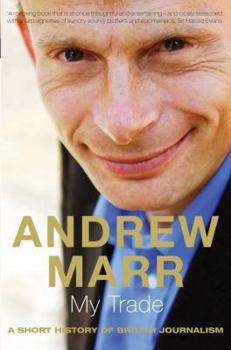My Trade: A Short History of British Journalism
Select Format
Select Condition 
Book Overview
How do you decide what is a 'story' and what isn't? What does a newspaper editor actually do all day? How do hacks get their scoops? How do the TV stations choose their news bulletins? How do you... This description may be from another edition of this product.
Format:Paperback
Language:English
ISBN:0330411926
ISBN13:9780330411929
Release Date:July 2005
Publisher:MacMillan UK
Length:405 Pages
Weight:0.77 lbs.
Dimensions:1.0" x 5.2" x 7.7"
Customer Reviews
2 ratings
Should be required reading
Published by Thriftbooks.com User , 18 years ago
Andrew Marr is one of the foremost political journalists of the modern age and in his book "My Trade - A Short History of British Journalism" he covers in a series of what are really essays the development of journalism in Britain. Where this book comes into it's own is the way in which Marr uses his knowledge and experience as a political journalist to explain the love/hate relationship between politicians and the press; and why both sides act in the way they do. With plenty of anecdotes this book is a serious but easy to read work that would be of interest to anybody interested either in jornalism or politics. Strangely for a book of this type there is no index, an omission that has prevented me from giving it top ranking but in all other aspects this is one of the best works of its kind that I have read recently.
excellent description, punchy, short on alternatives
Published by Thriftbooks.com User , 18 years ago
Marr's trade is journalism, he has been a print journalist, an editor and a BBC political correspondent in Britain for the last twenty years. The book gives an overview of the origins of and current influences on British journalism. The book is witty, informed and eminently readable, as you might expect. Marr doesn't spare us the basic ruthlessness of the trade - his early tasks as a cub reporter involved trying to get details on local crimes and deaths from the grieving next of kin, he later says that he wrote disparagingly of a rising Tory minister - John Patten - who had been a source, and Marr had been a guest at Patton's home. The book has a series of chapters - in fact they are long enough to be sections - on print journalism, British newspaper proprietors, Video-journalism, and political and special correspondents. In summary his heart is in print journalism, he thinks the proprietors are in general weird, upwardly mobile outsiders who bring business dynamism to the trade, I think he feels that video journalism is too rehearsed, too controlled by legal obligations to be `real', but it is hugely vivid, and he has both respect and a pleasingly level of scepticism about specialist correspondents, political or foreign. Marr feels that the development of political reporting (as opposed to British journalism) in Britain was brought about as much by parliament's need to communicate with potential taxpayers (who may not have been voters) during the time of the Napoleonic Wars, as much as by any ancient rites to free speech. One of the things about the book that I found most enlightening is the role of the editors and subeditors in sourcing the stories which will be printed, I suppose I was always aware that certain newspapers supported certain views - for example you will never find the Economist berating market-based solutions - but I was not aware of the extent to which Editors sent out reporters to find particular stories and `rewrite' the results to suit. Marr became editor of the Independent newspaper in England in the early Nineties, and largely judges himself to have failed at the task. The book carries a huge element of wistfulness for this period, and the life of the editor together with deadlines, financial pressure to attract particular types of readers - `more rolexes, less dead babies', and pressure, pressure, pressure. Marr brings us through the details of putting together a newspaper - the fastest changing news goes last to the printer - so sports are on the back page, the headlines and local news are on the first pages, features and soft news are towards the middle - the first pages printed. His views on video journalism are quite pointed and, while the technology is quite awesome and the skills involved are quite different to print, he sees the medium as being focused on the visual and the emotional. He quotes John Birt, a former head of BBC, about the emotional impact of video news driving out analysis, and Marr





